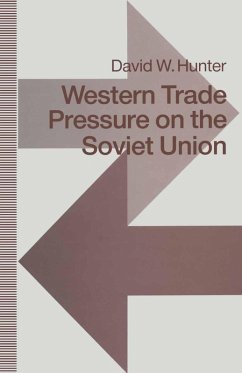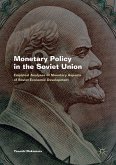David W. Hunter
Western Trade Pressure on the Soviet Union (eBook, PDF)
An Interdependence Perspective on Sanctions
40,95 €
40,95 €
inkl. MwSt.
Sofort per Download lieferbar

20 °P sammeln
40,95 €
Als Download kaufen

40,95 €
inkl. MwSt.
Sofort per Download lieferbar

20 °P sammeln
Jetzt verschenken
Alle Infos zum eBook verschenken
40,95 €
inkl. MwSt.
Sofort per Download lieferbar
Alle Infos zum eBook verschenken

20 °P sammeln
David W. Hunter
Western Trade Pressure on the Soviet Union (eBook, PDF)
An Interdependence Perspective on Sanctions
- Format: PDF
- Merkliste
- Auf die Merkliste
- Bewerten Bewerten
- Teilen
- Produkt teilen
- Produkterinnerung
- Produkterinnerung

Bitte loggen Sie sich zunächst in Ihr Kundenkonto ein oder registrieren Sie sich bei
bücher.de, um das eBook-Abo tolino select nutzen zu können.
Hier können Sie sich einloggen
Hier können Sie sich einloggen
Sie sind bereits eingeloggt. Klicken Sie auf 2. tolino select Abo, um fortzufahren.

Bitte loggen Sie sich zunächst in Ihr Kundenkonto ein oder registrieren Sie sich bei bücher.de, um das eBook-Abo tolino select nutzen zu können.
Analyzes growing US-Soviet economic interdependence and the implications of economic pressure in their relationship. From a review of US-Soviet economic relations, the author concludes that US embargo strategies against the USSR in the past have been futile, at times even counterproductive.
- Geräte: PC
- ohne Kopierschutz
- eBook Hilfe
- Größe: 15.16MB
Andere Kunden interessierten sich auch für
![East-West Economic Relations in the Changing Global Environment (eBook, PDF) East-West Economic Relations in the Changing Global Environment (eBook, PDF)]() East-West Economic Relations in the Changing Global Environment (eBook, PDF)113,95 €
East-West Economic Relations in the Changing Global Environment (eBook, PDF)113,95 €![Asian versus Western Management Thinking (eBook, PDF) Asian versus Western Management Thinking (eBook, PDF)]() Kimio KaseAsian versus Western Management Thinking (eBook, PDF)73,95 €
Kimio KaseAsian versus Western Management Thinking (eBook, PDF)73,95 €![Globalization and National Economic Welfare (eBook, PDF) Globalization and National Economic Welfare (eBook, PDF)]() M. PanicGlobalization and National Economic Welfare (eBook, PDF)73,95 €
M. PanicGlobalization and National Economic Welfare (eBook, PDF)73,95 €![Globalization and National Economic Welfare (eBook, PDF) Globalization and National Economic Welfare (eBook, PDF)]() M. PanicGlobalization and National Economic Welfare (eBook, PDF)30,95 €
M. PanicGlobalization and National Economic Welfare (eBook, PDF)30,95 €![Transition Strategies (eBook, PDF) Transition Strategies (eBook, PDF)]() H. HungenbergTransition Strategies (eBook, PDF)73,95 €
H. HungenbergTransition Strategies (eBook, PDF)73,95 €![Monetary Policy in the Soviet Union (eBook, PDF) Monetary Policy in the Soviet Union (eBook, PDF)]() Yasushi NakamuraMonetary Policy in the Soviet Union (eBook, PDF)97,95 €
Yasushi NakamuraMonetary Policy in the Soviet Union (eBook, PDF)97,95 €![The Politics of Economic Interdependence (eBook, PDF) The Politics of Economic Interdependence (eBook, PDF)]() Edmund DellThe Politics of Economic Interdependence (eBook, PDF)113,95 €
Edmund DellThe Politics of Economic Interdependence (eBook, PDF)113,95 €-
-
-
Analyzes growing US-Soviet economic interdependence and the implications of economic pressure in their relationship. From a review of US-Soviet economic relations, the author concludes that US embargo strategies against the USSR in the past have been futile, at times even counterproductive.
Dieser Download kann aus rechtlichen Gründen nur mit Rechnungsadresse in A, B, BG, CY, CZ, D, DK, EW, E, FIN, F, GR, HR, H, IRL, I, LT, L, LR, M, NL, PL, P, R, S, SLO, SK ausgeliefert werden.
Produktdetails
- Produktdetails
- Verlag: Palgrave Macmillan UK
- Seitenzahl: 163
- Erscheinungstermin: 18. Juni 1991
- Englisch
- ISBN-13: 9781349120024
- Artikelnr.: 45968412
- Verlag: Palgrave Macmillan UK
- Seitenzahl: 163
- Erscheinungstermin: 18. Juni 1991
- Englisch
- ISBN-13: 9781349120024
- Artikelnr.: 45968412
- Herstellerkennzeichnung Die Herstellerinformationen sind derzeit nicht verfügbar.
Part 1 Economic sanctions - pre-World War II through Cold War: The League of Nations; World War 2; export controls and the co-ordinating committee; the Korean War; dropping the CHINCOM differential. Part 2 East-West economic relations (1960-1985): the pipeline embargo; the Soviet grain sale; the Cuban embargo; President Nixon's decontrol of trade with The People's Republic of China; the 1970s era of detente; Afghanistan; martial law in Poland; the Versailles summit. Part 3 A conceptual framework of sanctions: anatomy of power; sanctions; symbolic vs instrumental sanctions; measures of effectiveness; instrumental sanctions; symbolic sanctions. Part 4 Economic dimensions of sanctions: patterns of trade flow; types of economic sanctions - export trade sanctions, boycotts, import trade sanctions, embargoes, financial sanctions; economic impact on the target state - short and long-term elasticity of demand, "Absolute Need" for the product, the structure of the target's economy. Part 5 Political significance of economic sanctions: alliance management - the Urengoi pipeline; sanctions as a form of deterrence - the imposition of martial law in Poland; domestic political objectives - the Jackson-Vanik amendment; political effects of economic sanctions. Part 6 Sanctions and East-West confrontation: the USSR - "Target State" - authoritarianism, nationalism (and Pan-Slavicism), economic profile, Eastern European ties; the western alliance - "Sanctioner States" - perspectives on detente, foreign policy independence within the alliance, shared "Burden" of economic sanctions, decision-making vacuum in East-West framework. Part 7 politico-economic prescription for East-West relations in an interdependent world: diagnosis of interdependence; how much interdependence is strategically wise?, how do we structure trade relations with the USSR for economic security; prognosis for the role of commercial policy in managing East-West relations; what decision-making structure is required?.
Part 1 Economic sanctions - pre-World War II through Cold War: The League of Nations; World War 2; export controls and the co-ordinating committee; the Korean War; dropping the CHINCOM differential. Part 2 East-West economic relations (1960-1985): the pipeline embargo; the Soviet grain sale; the Cuban embargo; President Nixon's decontrol of trade with The People's Republic of China; the 1970s era of detente; Afghanistan; martial law in Poland; the Versailles summit. Part 3 A conceptual framework of sanctions: anatomy of power; sanctions; symbolic vs instrumental sanctions; measures of effectiveness; instrumental sanctions; symbolic sanctions. Part 4 Economic dimensions of sanctions: patterns of trade flow; types of economic sanctions - export trade sanctions, boycotts, import trade sanctions, embargoes, financial sanctions; economic impact on the target state - short and long-term elasticity of demand, "Absolute Need" for the product, the structure of the target's economy. Part 5 Political significance of economic sanctions: alliance management - the Urengoi pipeline; sanctions as a form of deterrence - the imposition of martial law in Poland; domestic political objectives - the Jackson-Vanik amendment; political effects of economic sanctions. Part 6 Sanctions and East-West confrontation: the USSR - "Target State" - authoritarianism, nationalism (and Pan-Slavicism), economic profile, Eastern European ties; the western alliance - "Sanctioner States" - perspectives on detente, foreign policy independence within the alliance, shared "Burden" of economic sanctions, decision-making vacuum in East-West framework. Part 7 politico-economic prescription for East-West relations in an interdependent world: diagnosis of interdependence; how much interdependence is strategically wise?, how do we structure trade relations with the USSR for economic security; prognosis for the role of commercial policy in managing East-West relations; what decision-making structure is required?.







